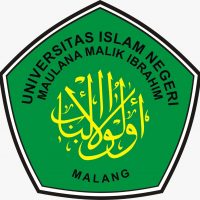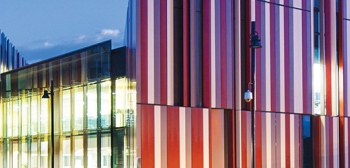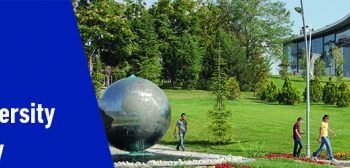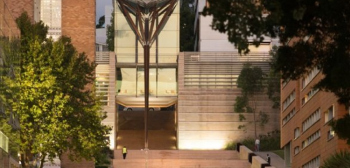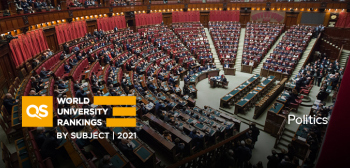Universitas Islam Negeri Maulana Malik Ibrahim Malang
About
Universitas Islam Negeri Maulana Malik Ibrahim Malang extracts its own philosophy from the treasures of Islamic tradition, Indonesian culture, and novelty as the foundations of thought, attitude, and activity. Officially established in 1961, the university was named after the leader of Wali Songo, Maulana Malik Ibrahim, the first scholar introducing and teaching Islam in Indonesia. It inspires the University to be the centre of Islamic civilization encouraging the students to be outstanding generation to strive for the revival of Islam as Rahmatan Lil Alamin. The university synergizes its course with Islamic teaching in guiding students as Ulul Albab (Islamic Scholar) to achieve deep spirituality, noble morality, broad knowledge and mature professionalism. In its position as the State Islamic Higher Education under the coordination of the Ministry of Religious Affairs of the Republic of Indonesia, the university has positioned itself as a strategic force in bequeathing the richness of civilization and Islamic thought.
The university development pillars consist of academic and supporting pillars. The academic pillars are composed of Faculties, Postgraduate Programs and Ma’had (Islamic Boarding School). The supporting pillars comprise human resources, Institute of Research and Community Service, Quality Assurance Institute, Library, Laboratories, Language Centre, international class program, administrative office, Mosques, Health Facilities, career development centre, sport and art facilities, International Affairs Office, Holding and Business Centre, Publication Centre, and Data and IT Centre. The faculties include the Faculty of Tarbiyah (Teacher Training and Education, Faculty of Sharia, Faculty of Humanities, Faculty of Psychology, Faculty of Economy, Faculty of Science and Technology, and Faculty of Medicine and Health Sciences.
Until recently, 20,000 students are pursuing their study in the university for undergraduate and postgraduate programs. The origin of local students comes from all provinces in Indonesia, meanwhile the origin of international student comes from 29 different countries around the world. Besides, nearly 100,000 applicants to the university every year. Meanwhile, only 4,100 new students are accepted annually since the university employ boarding school (Ma’had) system. The Ma’had system is required for all freshmen, first-year students. The main objectives of Ma’had are instilling spiritual values, moral nobility, religious moderation, and English and Arabic acculturation.
The university quality management system employs ISO 9001:2015 to demonstrate its ability to consistently provide academic services that meet stakeholder requirement and customer satisfaction. The public appreciation for the university can be found in numerous domestic and international cooperation, including Saudi Funds for Development, Local Government to build 12 ha of the 4th Campus in District of Malang, 100 ha 5th Campus in District of Lumajang, and other potential partnerships. The university has achieved numerous awards, such as A-level accreditation by National Accreditation Body for Higher Education, A-Level Library Accreditation, First rank National Good University Governance since 2019, AUN-QA Certification, FIBAA Accreditation, and many more. In response to the dynamic of contemporary era, the university positions itself as an inspiring and visionary institution in initiating the centre of excellence and Islamic civilization through Islamic education. This vision achievement is designed within the framework of university’s long-term strategic plan (2020 to 2034).
About
Universitas Islam Negeri Maulana Malik Ibrahim Malang extracts its own philosophy from the treasures of Islamic tradition, Indonesian culture, and novelty as the foundations of thought, attitude, and activity. Officially established in 1961, the university was named after the leader of Wali Songo, Maulana Malik Ibrahim, the first scholar introducing and teaching Islam in Indonesia. It inspires the University to be the centre of Islamic civilization encouraging the students to be outstanding generation to strive for the revival of Islam as Rahmatan Lil Alamin. The university synergizes its course with Islamic teaching in guiding students as Ulul Albab (Islamic Scholar) to achieve deep spirituality, noble morality, broad knowledge and mature professionalism. In its position as the State Islamic Higher Education under the coordination of the Ministry of Religious Affairs of the Republic of Indonesia, the university has positioned itself as a strategic force in bequeathing the richness of civilization and Islamic thought.
The university development pillars consist of academic and supporting pillars. The academic pillars are composed of Faculties, Postgraduate Programs and Ma’had (Islamic Boarding School). The supporting pillars comprise human resources, Institute of Research and Community Service, Quality Assurance Institute, Library, Laboratories, Language Centre, international class program, administrative office, Mosques, Health Facilities, career development centre, sport and art facilities, International Affairs Office, Holding and Business Centre, Publication Centre, and Data and IT Centre. The faculties include the Faculty of Tarbiyah (Teacher Training and Education, Faculty of Sharia, Faculty of Humanities, Faculty of Psychology, Faculty of Economy, Faculty of Science and Technology, and Faculty of Medicine and Health Sciences.
Until recently, 20,000 students are pursuing their study in the university for undergraduate and postgraduate programs. The origin of local students comes from all provinces in Indonesia, meanwhile the origin of international student comes from 29 different countries around the world. Besides, nearly 100,000 applicants to the university every year. Meanwhile, only 4,100 new students are accepted annually since the university employ boarding school (Ma’had) system. The Ma’had system is required for all freshmen, first-year students. The main objectives of Ma’had are instilling spiritual values, moral nobility, religious moderation, and English and Arabic acculturation.
The university quality management system employs ISO 9001:2015 to demonstrate its ability to consistently provide academic services that meet stakeholder requirement and customer satisfaction. The public appreciation for the university can be found in numerous domestic and international cooperation, including Saudi Funds for Development, Local Government to build 12 ha of the 4th Campus in District of Malang, 100 ha 5th Campus in District of Lumajang, and other potential partnerships. The university has achieved numerous awards, such as A-level accreditation by National Accreditation Body for Higher Education, A-Level Library Accreditation, First rank National Good University Governance since 2019, AUN-QA Certification, FIBAA Accreditation, and many more. In response to the dynamic of contemporary era, the university positions itself as an inspiring and visionary institution in initiating the centre of excellence and Islamic civilization through Islamic education. This vision achievement is designed within the framework of university’s long-term strategic plan (2020 to 2034).
University highlights
Similar Universities
The Central Academy of Drama, China
4E Hong Fu Middle Rd, Changping District
Henley Business School, University of Reading
Greenlands, Henley-on-Thames
Haskayne School of Business, University of Calgary
Scurfield Hall, Calgary
BI Norwegian Business School
Nydalsveien 34, Oslo
Atılım Üniversitesi
Kizilcasar M. Incek, Ankara
The University of New South Wales (UNSW Sydney)
High St, Kensington, Sydney
43 QS World University RankingsRelated content

Studying Abroad in Australia…

13 Reasons Why You'll L…

Everything You Need to Know…
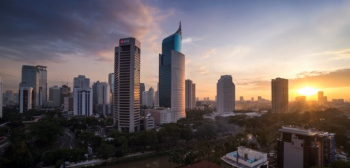
Jakarta

International Scholarships f…
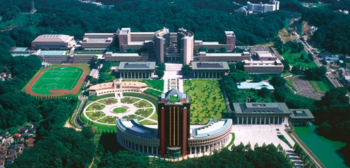
Top Universities in Asia for…
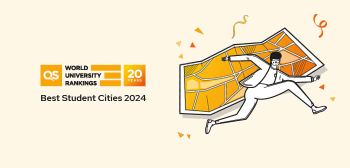
QS Best Student Cities 2024:…
Test preparations
Featured University


-
10 UG & 47 PGTotal courses
-
PrivateStatus
-
HighResearch output
